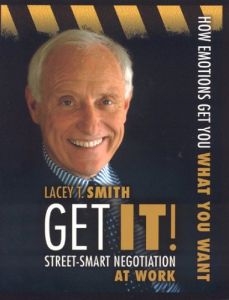
Get It! Street-Smart Negotiation at Work
How Emotions Get You What You Want
Recommendation
Author Lacey T. Smith is extremely down to earth. He presents his suggestions for how to recognize the emotional components of negotiations in clear and fairly basic English. He illustrates each suggestion with one or more stories and then distills the suggestions into brief, pointed lessons. Because of its clarity, getAbstract.com recommends this book to all levels of readers who will be engaging in negotiation. You will find something you can use. However, some of Smith’s techniques can be applied only over the course of time, such as allotting time to videotape practice negotiations and to analyze the level of rapport you manage to establish. Other suggestions are extremely challenging, such as committing oneself consciously to developing and practicing empathy. Therefore, while the book can be read profitably by anyone - and enjoyably, given Smith’s folksy honesty - unless you are a committed, experienced negotiator, you may not be interested in all of Smith’s lessons or even able to apply them.
Summary
About the Author
Lacey T. Smith has a Princeton M.B.A. and a Harvard law degree. In addition to studying negotiation at the Harvard Negotiation Project and Northwestern’s Kellogg School, Smith has negotiated in various industries. A former reporter, he has served as a state senator and assistant attorney general in Kentucky. Smith and his wife teach seminars on negotiation.

















Comment on this summary